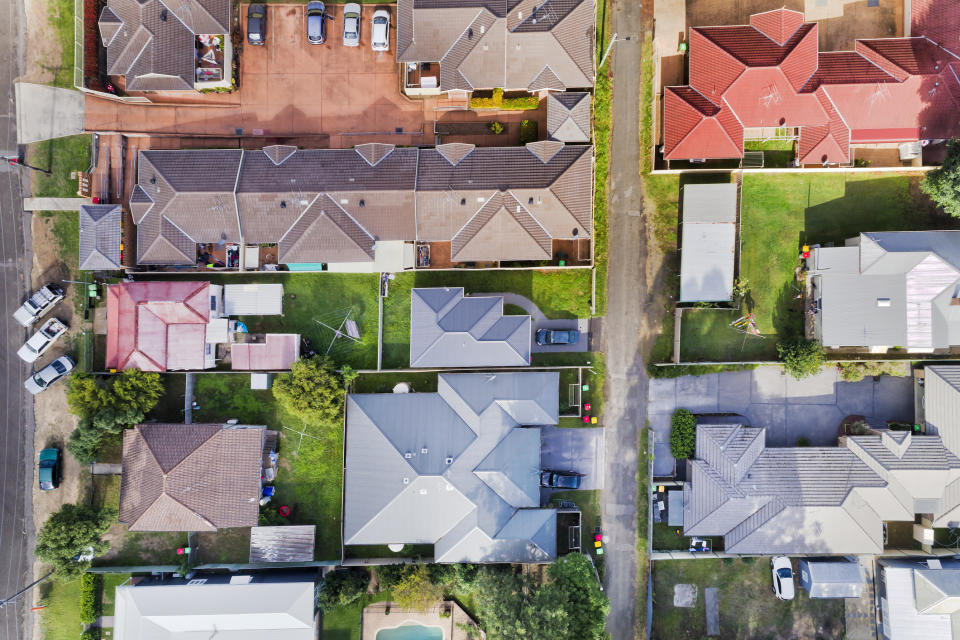Australian house price crash named major global risk for 2020

Deutsche Bank has warned a potential house price crash in Australia is one of the top 20 risks to global financial markets in 2020.
Related story: This app shows your house price in real-time
Related story: House prices in these two cities are set for double-digit growth
Related story: How long does it take to save for a house deposit in your capital city?
In a note sent to clients, obtained by CNBC, Deutsche Bank said Brexit uncertainty, trade war concerns and an increase in wealth inequality and income inequality were also major concerns.
This is the complete list:
Continued increase in wealth inequality, income inequality and healthcare inequality
Phase one trade deal remains unsigned, continued uncertainty about what comes after phase one.
Trade war uncertainty continued to weigh on corporate capex decisions.
Ongoing slow growth in China, Europe and Japan Triggering significant US dollar appreciation.
Impeachment uncertainty & possible government shutdown.
US election uncertainty; implications for taxes, regulation and capex spending.
Antitrust, privacy and tech regulation.
Foreigners lose appetite for US credit and US Treasuries following Presidential election.
MMT-style fiscal expansion boosts growth significantly in US and/or Europe.
US government debt levels begin to matter for long rates.
Mismatch between demand and supply in T-bills, another repo rate spike.
Fed reluctant to cut rates in election year.
Credit conditions tighten with more differentiation between CCC and BBB corporate credit.
Credit conditions tighten with more differentiation between CCC and BBB consumer credit.
Fallen angels: More companies falling into BBB. And out of BBB into HY.
More negative-yielding debt sends global investors on renewed hunt for yield in US credit.
Declining corporate profits means fewer dollars available for buybacks.
Shrinking global auto industry a risk for global markets & economy.
House price crash in Australia, Canada and Sweden.
Brexit uncertainty persists.
According to IBISWorld, continued interest rate cuts from the Reserve Bank of Australia present risks - especially if cuts continue into negative figures.
“The RBA has stated that it would consider using a quantitative easing-style program to inject more money into the economy. Ideally, the recipients of these funds would use them to make greater investments and generate economic activity. However, the effectiveness of this policy in Australia is likely to be limited, given the existing abundance of money supply,” senior analyst Jason Aravanis said in a note.
“It is also possible that these funds will flow into the property market instead. Consequently, this measure risks only further inflating housing prices rather than stimulating the economy.”
RBA governor Philip Lowe also warned in September that progressive rate cuts run the risk of “just pushing up asset prices”. Lowe has consistently pushed for the government to explore other measures of boosting Australia’s flagging economy.
And economists have echoed his calls.
“Given Australian households carry an egregious amount of household debt already policy-makers need to find ways to generate growth that don’t rely on credit,” IFM economist Alex Joiner said on Thursday.
He was responding to former federal treasurer Peter Costello’s comments that Australia’s monetary policy plans are running out of gas.
“Aggressive monetary policy easing by central banks has created a situation in which accommodation is now more difficult to remove,” Joiner added in a note.
“Given the high level of private debt across the developed world, rising interest rates are much more powerful than in the past.
“Monetary policy has become a very asymmetric tool - further policy easing will likely have limited impact on corporate and household behaviour but raising rates would likely have a material impact on heavily indebted households, particularly newer borrowers.”

Controversial real estate pundit Harry Dent has also said Australian house prices are 40 per cent overvalued, with a crash still on its way.
But the head of SQM Research Louis Christopher told News Corp Dent’s words should be taken with a fair grain of salt: “I am concerned for people who get hoodwinked into his seminars.”
However, in SQM Research’s annual Boom and Bust Report 2020 released today, Christopher did agree that Sydney and Melbourne house prices are growing from an “overvalued point”.
“The Sydney and Melbourne housing markets have recorded a sharp turnaround in the second half of 2019 following on from the surprise result of the Federal Election, interest rate cuts, the loosening of credit restrictions and ongoing strong population growth rates. These factors are expected to drive the national housing market into 2020. In a close call, APRA is expected to not immediately intervene despite the strong price rises,” Christopher said.
“However we have some misgivings on the sustainability of this new recovery. Sydney and Melbourne are rising from an overvalued point. Long term, our two largest housing markets look vulnerable and forever reliant on cheap credit. Housing debt, while falling compared to GDP over 2019, is still very high. Better value can definitely found elsewhere such as Perth and Brisbane.”
S&P Global ratings also believes that housing sector risks are abating.
In a research note released this morning, S&P said the residential mortgage-backed securities sector is facing fewer risks.
“Lower interest rates, signs of stabilisation in some property markets, and improving refinancing conditions will sustain this performance in the coming months, in our opinion,” the researchers said.
“Economic conditions have weakened in the past year, however, and weak wage growth and high household debt show no signs of abating, leaving some borrowers vulnerable.
“We expect households to adopt a more cautious approach to debt serviceability in the coming months by taking advantage of lower interest rates to pay down their mortgages. This will help enhance equity buffers and increase households' resilience to any economic downturns.”
Make your money work with Yahoo Finance’s daily newsletter. Sign up here and stay on top of the latest money, property and tech news.

 Yahoo Finance
Yahoo Finance 
